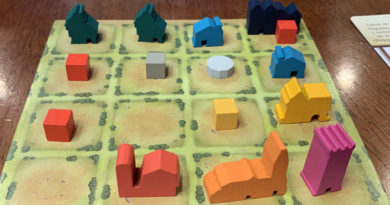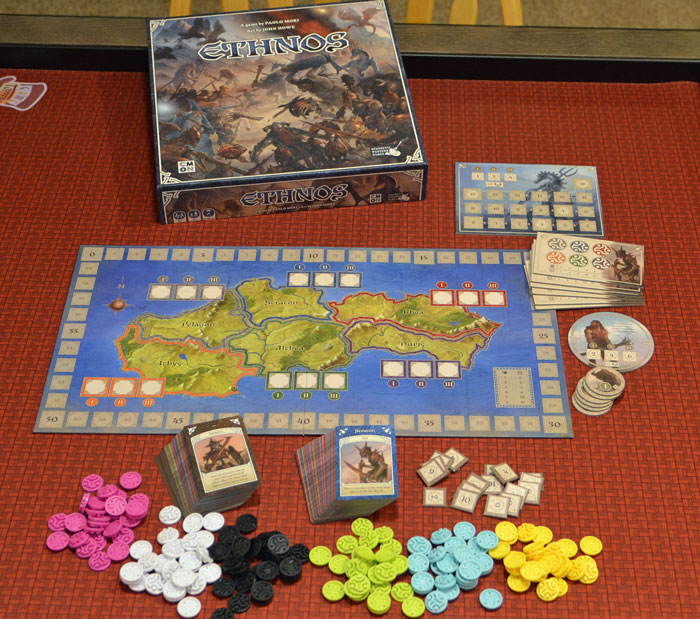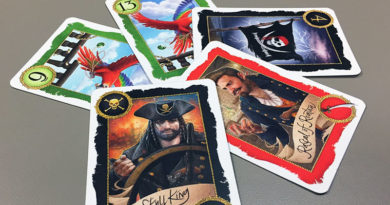Lander Board Game Preview
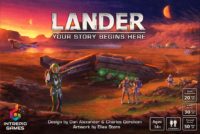
If you crash landed on a foreign planet, what would you do?
First of all, the good news is that you survived. And while a lot of the crew that was sent to establish a colony on the planet perished in the crash, a handful of survivors are there with you.
With that type of a set up, you might think Lander, an upcoming new game by Intrepid Games, would be a cooperative game where you’ll all rally together to establish a flourishing colony.
In that you’d be wrong.
Lander is actually a competitive game for 2-4 players where each player builds their own crew, manages resources, expands and upgrades their sectors, and completes missions in an effort to become the overall leader of this new colony.
If you’re ready to take on such an adventure, read on.
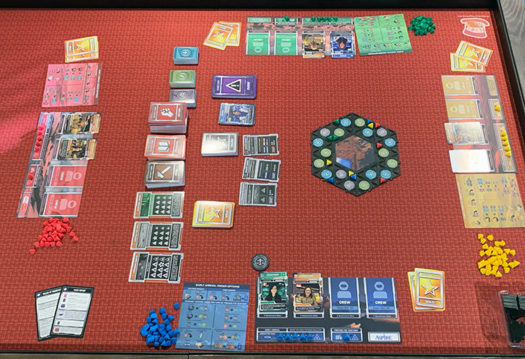
How to play Lander
Lander is a game with a lot of depth – if you want it to be.
There are actually 3 different play styles that you can choose from when embarking on this colonizing effort. First, there’s a Basic Simulation that introduces the game mechanics well. Next is an Early Arrival, game that’s a short version of the full game. Then there’s the Planned Arrival that grants a full experience.
In all 3 variations, players assume the role of corporate representatives competing to develop their resources and crew to complete missions. The game progresses over a series of colonizing years (game rounds) where players claim resources, expand into new sectors, and upgrade their existing sectors to generate more resources.
Because there’s a lot of depth to the game, I won’t describe every aspect of the game. Instead, I’ll just highlight the general flow and mechanics of the game.
Players start by drafting 2 crew members and can add up to 2 more during the game on their Crew sheet. Each crew member can also acquire new skills through training, items, and other traits to help complete missions.
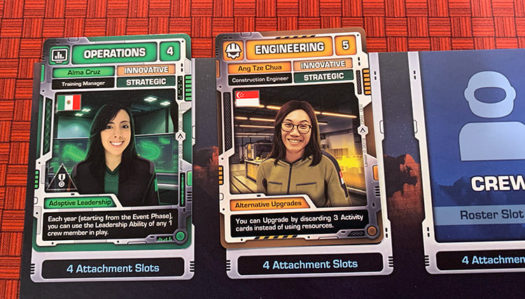
At the outset, hexes are randomly drawn and placed around the central hex. Then players take turns placing their structures (markers) on sectors. There are 3 types of resources that sectors generate (Energy, Food, and Titanium) and each sector also indicates how many resources are produced based on the numbers on the tile.
The first structure on a sector is placed in the lowest value and as the sector is upgraded, the additional structures are placed at the higher numbers. So, when it produces resources, it will grant the highest value next to a structure in that sector.
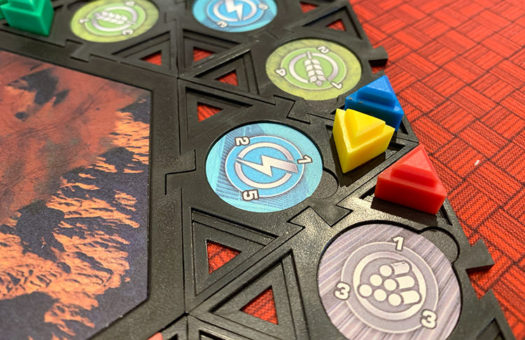
At the start of each Year, each player (in turn) will draw an Event card and read the scenario and react to it (may be good or bad). Each player will then draw on sector tile and place it anywhere. They then place one of their structures on the closest available unoccupied sector adjacent to a sector they own. Then resources are claimed based on controlled sectors, and modified by events, items, and crew leadership abilities. Each player also gains additional Activity, Item, and Training cards.
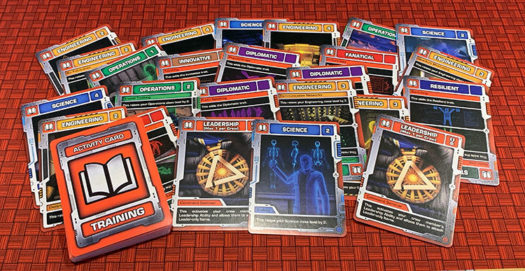
Then players take turns completing Orders (actions). Some orders can be completed Anytime. Some actions are Free actions. And some are Official Orders.
If a player chooses to do a Free Action, they must do them at the start of their turn. They include adding Training to a crew member, adding, moving or discarding Items, or converting resources.
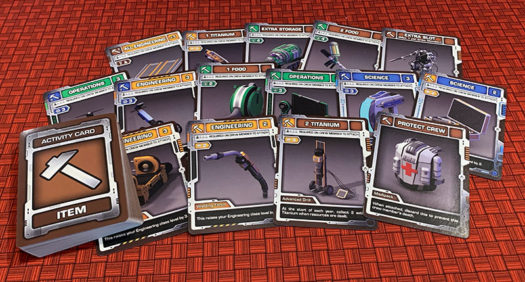
Then a player does 1 Official Order for their turn. These include:
- Expanding sectors
- Upgrading structures
- Getting new Crew members
- Using Leadership abilities
- Purchasing Action, Item, or Training cards
- Playing an Action card
- Completing a Mission
- Negotiating
- Consolidating Activities
- Observing
In addition to their Crew sheet, players also get a reference sheet that lists these actions they can take on their turn as well as the costs in resources for doing some of them.
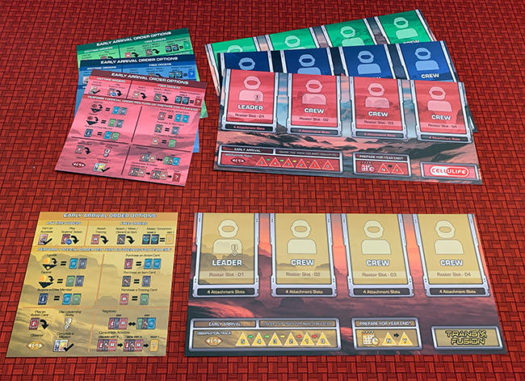
After a player has completed 1 Official Order, play goes to the next player. Players continue taking turns with their Orders until all players cannot give any more orders or choose not to. Then they Prepare for Year End. This means that everyone discards down to 5 Resource and 5 Activity cards in hand. Any temporary cards in play are removed and Leadership abilities are reset.
The end of the game is triggered based on different criteria in the variations. In the Basic Simulation, the first player to reach 7 Mission Stars is the winner. In Early Arrival, the last year is triggered when a player reaches 10 Mission Stars and the player with the most mission stars at the end of that year is the winner. In Planned Arrival, the player with the most mission stars at the end of Year 5 is the winner.
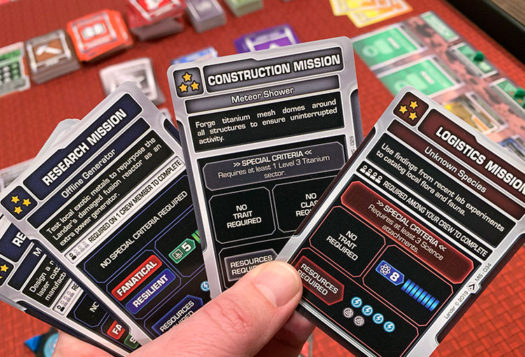
Can the whole family enjoy Lander?
As you can see based on the list of Official Orders above, the crux of Lander rests on what players choose to do with their Orders. And there are a lot of options.
Because of this, Lander isn’t going to appeal to the whole family.
The recommended age on the game box is 14+ and that feels like a good estimate to us.
Plus depending on which variation you choose to play, a game may last anywhere from 1 hour to 3 hours.
There’s plenty to think about during the game — which is very appealing to those in my buddy group. However, that’s not the case with all those in our family.
That being said, for those that like games with lots of options, Lander is worth diving into.
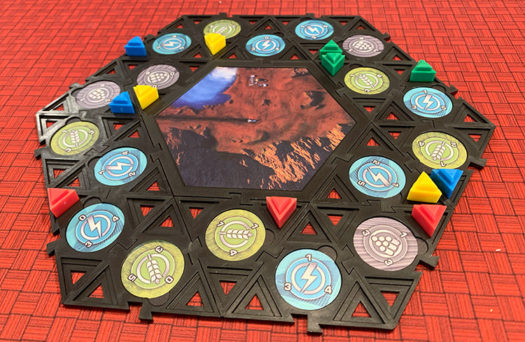
At the outset, looking at the board with structures placed on different resource locations, it may make you think of Catan. In Catan, players gain resources indicated by the hex their settlements and cities are on when the dice are rolled. However, Lander definitely isn’t Catan.
For starters, the Lander board is incredibly dynamic. Players expand the board by choice as they draw and place sectors with varying resource payouts. And there isn’t any dice rolling in the game. Everyone gets the resources their sectors provide. No one is left out in that regard.
So, it’s really just the resource-rich board that looks like it might have a similarity to Catan. Lander offers a lot more.
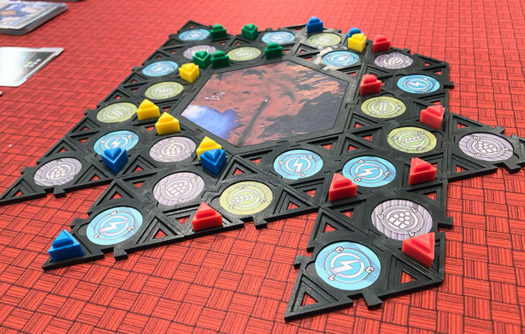
Having a crew that you can improve through Training, Traits, and Items is very cool. Some of your Crew members may die (and you can knock off other player’s crew), but you’ll be able to replace them along the way. And each Crew member has special abilities they’ll bring to the mix. Besides their Traits, they each have a Leadership ability that can be used while that Crew member is the Leader. Using those wisely can make a big difference.
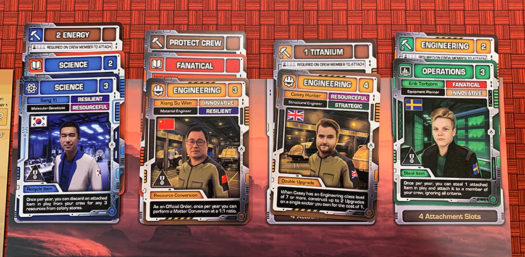
Choosing when and where to expand also presents intriguing choices throughout the game. Or it may be more beneficial to simply upgrade the sectors you already control to get more resources.
Yet that all depends on what the Missions are that game!
The Silver and Gold Mission decks have a ton of cards and only a few Public Missions will be in play each game. Plus, in the Early Arrival and Planned Arrival games, players will also have secret, Private Missions that only they may complete.
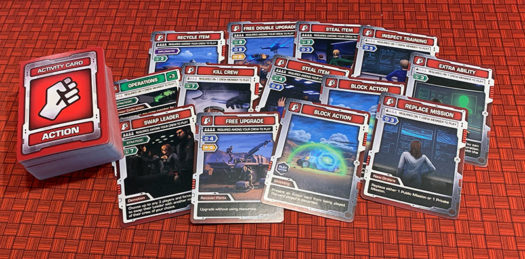
If that weren’t enough, every round starts with random Events causing havoc among the colony. Or if not complete havoc, at least enough trouble that players will need to adjust their strategies along the way.
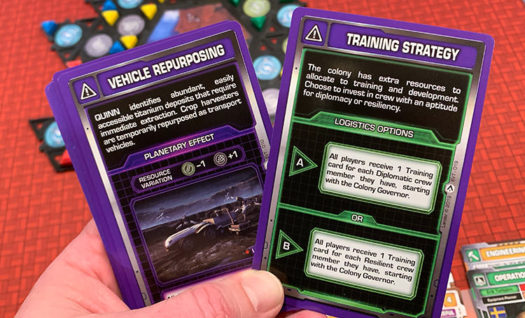
And as you can see in the photos, there are a ton of cards in every deck. This means there’s a ton of replay value in Lander because you’ll face unique challenges and opportunities every game.
If you’re looking for a game that pulls you in and keeps you thinking about your strategies throughout the game, Lander has what you’re looking for.
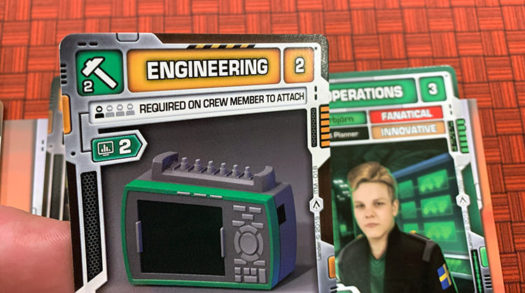
The really good news is that you can test out the game before you pledge to their Kickstarter campaign (starting March 3, 2020). Intrepid Games is running a Play Before You Pledge drive. They’ve sent over 130 demo copies to stores around the world where people can go try the game.
Check out the Lander website to find if there’s a copy at a local game store near you!
Game Components
We’ve also been very impressed with the quality of the Lander components. As Lander is just now coming to Kickstarter to raise funds for publishing the game, that means we’ve been playing with prototype components!
I don’t recall playing a pre-Kickstarter game with as much put into the game as with Lander.
The center piece of the game – the modular board with the central hex and triangle sector tiles – is awesome. The pieces snap together so well. And we love building out the board. It’s fun to expand sectors just to get to add another cool tile to the growing board.
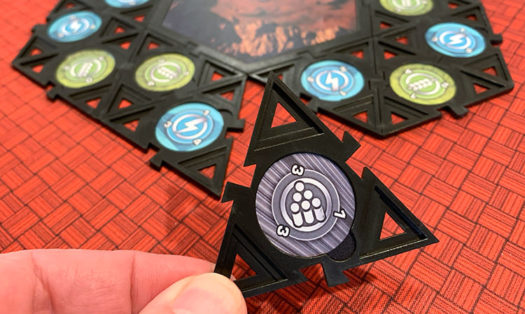
And the structure markers that players use to claim their sectors fit in nicely as well.
Plus, the number of cards in each deck is awesome. The Crew cards alone total 60!
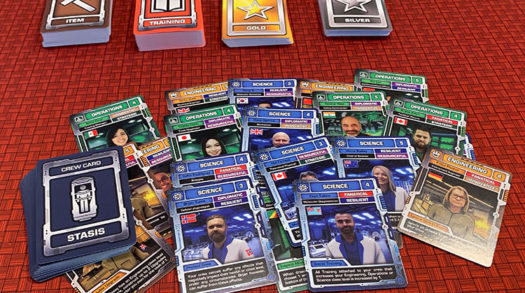
The rule book is also extremely thorough.
The rule book is 47 pages that describe everything in detail. The general game play and 3 variations are described in the first 13 pages and the rest is titled “Reference Manual” that goes into detail on the individual elements of the game such as the Orders players can make, cards, Missions, Accolades and terminology. (See why we only covered the highlights of game play?)
Yet that isn’t all, because the game also includes 3 small Setup booklets for the 3 different variations of game play. It makes it really easy to get the game rolling. You choose which way you want to play and then just grab the corresponding little booklet to get all set up.
With this much going into the demo copy, we have no doubt Intrepid Games will publish a high-quality game.
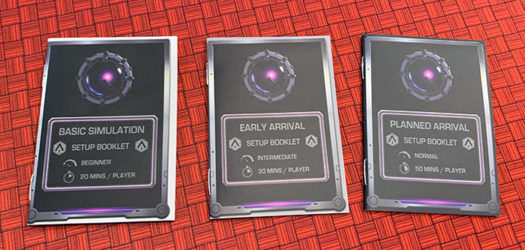
How does Lander score on our “Let’s Play Again” game meter?
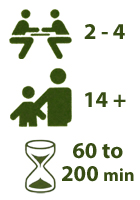 If you’ve read this far, you may already have an idea of Lander will score on our family’s “let’s play again” game meter.
If you’ve read this far, you may already have an idea of Lander will score on our family’s “let’s play again” game meter.
As far as family game play goes, it’s not a fit for our crew.
But like I pointed out above, Lander is a good fit for buddies game night.
And that’s perfectly fine. That’s why we have such a wide variety of games – so we can play the right game with the right gang.
For a game group that enjoys games with a lot going on, plenty of choices to make, and evolving strategies, Lander may be right up your alley.
And remember, you can give it a try yourself before pledging to the Kickstarter campaign. Check out the Lander website to find if your local game store has a demo copy to play.
Happy exploring and colonizing!
We’d like to thank Intrepid Games for a preview copy of Lander.



